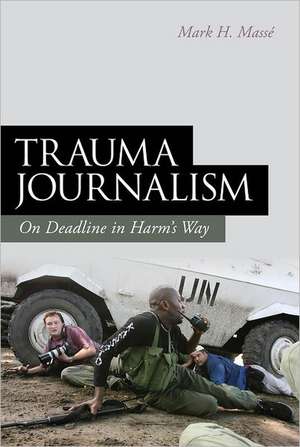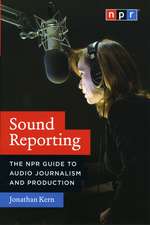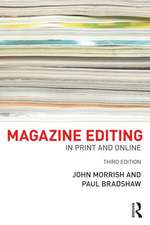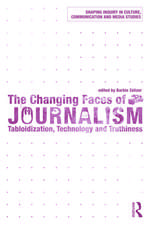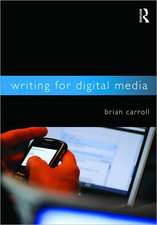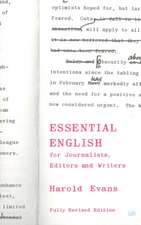Trauma Journalism: On Deadline in Harm's Way
Autor Mark H. Masséen Limba Engleză Hardback – 7 dec 2011
The role of journalists in covering trauma and tragedy isn't new. Witnessing acts of violence, destruction and terror has long been the professional responsibility of countless print and broadcast reporters and photographers. But what is new is a growing awareness of the emotional consequences of such coverage on the victims, their families and loved ones, their communities, and on the journalists whose job it is to tell these stories. Trauma Journalism personalizes this movement with in-depth profiles of reporters, researchers and trauma experts engaged in an international effort to transform how the media work under the most difficult of conditions.
Through biographical sketches concerning several significant traumatic events (Oklahoma City bombing, Columbine school tragedy, 9/11, Iraq War, the South Asian tsunami, Hurricane Katrina), students and working reporters will gain insights into the critical components of contemporary journalism practices affecting news judgment, news gathering techniques, as well as legal and ethical issues. Trauma Journalism calls for the creation - through ongoing education - of a culture of caring among journalists worldwide.
Through biographical sketches concerning several significant traumatic events (Oklahoma City bombing, Columbine school tragedy, 9/11, Iraq War, the South Asian tsunami, Hurricane Katrina), students and working reporters will gain insights into the critical components of contemporary journalism practices affecting news judgment, news gathering techniques, as well as legal and ethical issues. Trauma Journalism calls for the creation - through ongoing education - of a culture of caring among journalists worldwide.
| Toate formatele și edițiile | Preț | Express |
|---|---|---|
| Paperback (1) | 191.38 lei 6-8 săpt. | |
| Bloomsbury Publishing – 7 dec 2011 | 191.38 lei 6-8 săpt. | |
| Hardback (1) | 568.80 lei 6-8 săpt. | |
| Bloomsbury Publishing – 7 dec 2011 | 568.80 lei 6-8 săpt. |
Preț: 568.80 lei
Preț vechi: 815.94 lei
-30% Nou
Puncte Express: 853
Preț estimativ în valută:
108.87€ • 112.19$ • 91.91£
108.87€ • 112.19$ • 91.91£
Carte tipărită la comandă
Livrare economică 03-17 martie
Preluare comenzi: 021 569.72.76
Specificații
ISBN-13: 9781441105400
ISBN-10: 1441105409
Pagini: 248
Ilustrații: 15
Dimensiuni: 152 x 229 x 23 mm
Greutate: 0.5 kg
Ediția:New.
Editura: Bloomsbury Publishing
Colecția Continuum
Locul publicării:New York, United States
ISBN-10: 1441105409
Pagini: 248
Ilustrații: 15
Dimensiuni: 152 x 229 x 23 mm
Greutate: 0.5 kg
Ediția:New.
Editura: Bloomsbury Publishing
Colecția Continuum
Locul publicării:New York, United States
Caracteristici
Includes oral histories, case studies and discussions with journalists who have covered trauma and tragedy.
Notă biografică
Mark H. Massé is a professor of literary journalism at Ball State University. A longtime freelancer, he is the author of Inspired to Serve: Today's Faith Activists and Delamore's Dreams, a novel. The New York native has degrees from the University of Oregon and Miami University, USA.
For more information, visit www.markmasse.com.
Cuprins
Foreword
Preface
"High Wire"
Chapter 1: Tracking a Media Movement
Faces of Trauma Journalism: Terry Anderson
Chapter 2: Transformer
Faces of Trauma Journalism: Molly Bingham
Chapter 3: Frontline Reporting
Faces of Trauma Journalism: Scott North
Chapter 4: In Tragedy's Wake
Faces of Trauma Journalism: Amy Dockser Marcus
Chapter 5: Traumatic Stress Studies
Faces of Trauma Journalism: David Handschuh
Chapter 6: Media Training and Intervention
Faces of Trauma Journalism: George Hoff
Chapter 7: News Reform 101
Faces of Trauma Journalism: Judith Matloff
Chapter 8: Culture of Caring
Faces of Trauma Journalism: Michelle Faul
Acknowledgments
Endnotes
Bibliography
Biography
Index
Preface
"High Wire"
Chapter 1: Tracking a Media Movement
Faces of Trauma Journalism: Terry Anderson
Chapter 2: Transformer
Faces of Trauma Journalism: Molly Bingham
Chapter 3: Frontline Reporting
Faces of Trauma Journalism: Scott North
Chapter 4: In Tragedy's Wake
Faces of Trauma Journalism: Amy Dockser Marcus
Chapter 5: Traumatic Stress Studies
Faces of Trauma Journalism: David Handschuh
Chapter 6: Media Training and Intervention
Faces of Trauma Journalism: George Hoff
Chapter 7: News Reform 101
Faces of Trauma Journalism: Judith Matloff
Chapter 8: Culture of Caring
Faces of Trauma Journalism: Michelle Faul
Acknowledgments
Endnotes
Bibliography
Biography
Index
Recenzii
Imagine, journalists are human, too! But until recent years, few thought about the psychological perils of experiencing and reporting on traumatic events. Now Mark Masse' has written a fascinating and fact-filled account of how "trauma journalism" finally is being recognized and treated from the classroom to professional newsrooms. To make his case, he takes you from the terror bombing of the federal building in Oklahoma City to tragedies and battlefields around the world, where journalists have shared the danger, the fear, and often the consequences of the participants themselves. -- Steve Bell, former ABC News correspondent/anchor, Vietnam War reporter, and retired Ball State University professor
To date, the most comprehensive works covering various aspects of journalism and trauma are the groundbreaking textbook Covering Violence: A Guide to Ethical Reporting about Victims and Trauma (Simpson and Coté 2006), the Dart Center for Journalism and Trauma website, a special 2009 edition of Nieman Reports (Ludtke 2009) devoted to trauma coverage, and Trauma Journalism: On Deadline in Harm's Way (Massé 2011)...Massé 2011 continues this work with a fresh overview of the field and new case studies from working journalists... Builds on the existing literature to provide an updated overview of the field of journalism and trauma, including practical, ethical, and legal information for journalists and students. Personal stories about journalists who have covered tragedy help illustrate primary points and issues in each chapter.
The most comprehensive attempt yet to describe what life is like for reporters when the cameras stop rolling and the lights are off. Massé's fine book is an antidote to the belief that all war correspondents are adrenaline junkies. Perhaps in the future, managing the risks to those who report violence will be routine in newsrooms. This book is a signpost towards that promised land. --David Loyn, BBC correspondent and author of Frontline: Reporting from the World's Deadliest Places
Interview on WIBC, NPR's Indianapolis affiliate.
Meticulous research, crackerjack journalism. -- Mark Brayne, former director, Dart Centre (for Journalism & Trauma) Europe, longtime (UK) broadcast correspondent and trauma researcher/therapist
We talk often about members of the military suffering from trauma, but author Mark Massé takes us on a journey into the world of reporters who witness conflicts and crises and endure the consequences. A must read for anyone who cares about the news and those men and women who keep us informed. - Qais Faqiri, international broadcaster, Voice of America, Washington, D.C.
I believe Masse's book is another welcome addition to the study of trauma's effect on journalists. Masse's most effective tool is the stories he takes directly from journalists. The book is littered with powerful quotes from domestic and international journalists who have seen the effects of tragedy on reporting. This book should be mandatory for any young journalist thinking of pursuing a career in the field. The book touches on important topics that are often not discussed in classes either because they are 'taboo' or simply uncomfortable. But, Masse's well-researched book shows the reality of the profession. -- Matt Porter, the Daily ((SOT)), Syracuse University, http://www.mp-reports.com/blog/?p=307
Masse's most effective tool is the stories he takes directly from journalists... This book should be mandatory for any young journalist thinking of pursuing a career in the field. The book touches on important topics that are often not discussed in classes either because they are "taboo" or simply uncomfortable.
Author Mark Masse wrote an op-ed that was picked up on a number of blog wire services. http://www.nwitimes.com/news/opinion/guest-commentary/guest-commentary-when-war-journalists-come-home/article_d741b848-e229-598b-ade5-5c2e8fc0ee65.html
Author Mark Masse has written an Op-Ed in The Indiana Star-Press http://www.thestarpress.com/apps/pbcs.dll/article?AID=2012202120330
"Mark Masse has really provided a great resource to newsrooms around the world." -Andy Lippman, former Associated Press Los Angeles Bureau Chief
"This book is rich in primary anecdotes from journalists who paint a realistic picture of the difficulties and rewards of their work. But Massé goes much further, compiling research done on traumatic stress and including valuable tips. His chapter on 'Media Training and Intervention,' for example, includes guidelines for interviewing victims of tragedy, including children; risk assessment; contingency planning; and self-care. There is also a terrific section for college media advisers with tips on handling campus disasters. Massé's book will make journalists think hard about a newsroom culture that is sometimes brutal. 'Trauma Journalism' would be a terrific resource for both reporting and ethics classes, and it will interest working journalists and media scholars as well." -American Journalism, Winter 2012
To date, the most comprehensive works covering various aspects of journalism and trauma are the groundbreaking textbook Covering Violence: A Guide to Ethical Reporting about Victims and Trauma (Simpson and Coté 2006), the Dart Center for Journalism and Trauma website, a special 2009 edition of Nieman Reports (Ludtke 2009) devoted to trauma coverage, and Trauma Journalism: On Deadline in Harm's Way (Massé 2011)...Massé 2011 continues this work with a fresh overview of the field and new case studies from working journalists... Builds on the existing literature to provide an updated overview of the field of journalism and trauma, including practical, ethical, and legal information for journalists and students. Personal stories about journalists who have covered tragedy help illustrate primary points and issues in each chapter.
The most comprehensive attempt yet to describe what life is like for reporters when the cameras stop rolling and the lights are off. Massé's fine book is an antidote to the belief that all war correspondents are adrenaline junkies. Perhaps in the future, managing the risks to those who report violence will be routine in newsrooms. This book is a signpost towards that promised land. --David Loyn, BBC correspondent and author of Frontline: Reporting from the World's Deadliest Places
Interview on WIBC, NPR's Indianapolis affiliate.
Meticulous research, crackerjack journalism. -- Mark Brayne, former director, Dart Centre (for Journalism & Trauma) Europe, longtime (UK) broadcast correspondent and trauma researcher/therapist
We talk often about members of the military suffering from trauma, but author Mark Massé takes us on a journey into the world of reporters who witness conflicts and crises and endure the consequences. A must read for anyone who cares about the news and those men and women who keep us informed. - Qais Faqiri, international broadcaster, Voice of America, Washington, D.C.
I believe Masse's book is another welcome addition to the study of trauma's effect on journalists. Masse's most effective tool is the stories he takes directly from journalists. The book is littered with powerful quotes from domestic and international journalists who have seen the effects of tragedy on reporting. This book should be mandatory for any young journalist thinking of pursuing a career in the field. The book touches on important topics that are often not discussed in classes either because they are 'taboo' or simply uncomfortable. But, Masse's well-researched book shows the reality of the profession. -- Matt Porter, the Daily ((SOT)), Syracuse University, http://www.mp-reports.com/blog/?p=307
Masse's most effective tool is the stories he takes directly from journalists... This book should be mandatory for any young journalist thinking of pursuing a career in the field. The book touches on important topics that are often not discussed in classes either because they are "taboo" or simply uncomfortable.
Author Mark Masse wrote an op-ed that was picked up on a number of blog wire services. http://www.nwitimes.com/news/opinion/guest-commentary/guest-commentary-when-war-journalists-come-home/article_d741b848-e229-598b-ade5-5c2e8fc0ee65.html
Author Mark Masse has written an Op-Ed in The Indiana Star-Press http://www.thestarpress.com/apps/pbcs.dll/article?AID=2012202120330
"Mark Masse has really provided a great resource to newsrooms around the world." -Andy Lippman, former Associated Press Los Angeles Bureau Chief
"This book is rich in primary anecdotes from journalists who paint a realistic picture of the difficulties and rewards of their work. But Massé goes much further, compiling research done on traumatic stress and including valuable tips. His chapter on 'Media Training and Intervention,' for example, includes guidelines for interviewing victims of tragedy, including children; risk assessment; contingency planning; and self-care. There is also a terrific section for college media advisers with tips on handling campus disasters. Massé's book will make journalists think hard about a newsroom culture that is sometimes brutal. 'Trauma Journalism' would be a terrific resource for both reporting and ethics classes, and it will interest working journalists and media scholars as well." -American Journalism, Winter 2012
Descriere
Descriere de la o altă ediție sau format:
Through biographical sketches concerning several significant traumatic events, this title helps students and working reporters gain insights into the critical components of contemporary journalism practices affecting news judgment, news gathering techniques, as well as legal and ethical issues.
Through biographical sketches concerning several significant traumatic events, this title helps students and working reporters gain insights into the critical components of contemporary journalism practices affecting news judgment, news gathering techniques, as well as legal and ethical issues.
